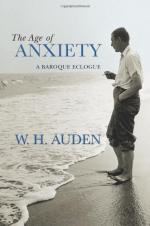|
This section contains 1,536 words (approx. 6 pages at 300 words per page) |

|
SOURCE: "Ironic Harmony: Blues Convention and Auden's 'Refugee Blues,'" in Journal of Modern Literature, Vol. XVIII, No. 1, Winter, 1992, pp. 139-42.
In the following essay, Held discusses the significance of Auden's appropriation of blues music convention in "Refugee Blues."
All art, Walter Pater declared, aspires to the condition of music. However, Pater's oft-quoted dictum hardly anticipates its ironic implementation in W. H. Auden's "Refugee Blues." "Refugee Blues" adapts the conventions of the blues to Auden's portrait of exiles in flight from Europe on the eve of the Second World War. Yet beneath the modifications which Auden grafts to it, the poem retains a core of integrity as a blues in form and theme.
"Refugee Blues" directly reflects Auden's experience of his new home after his emigration to New York in 1939. The city harbored thousands of refugees from Europe's upheavals, many of them persons of high attainments, as is...
|
This section contains 1,536 words (approx. 6 pages at 300 words per page) |

|


